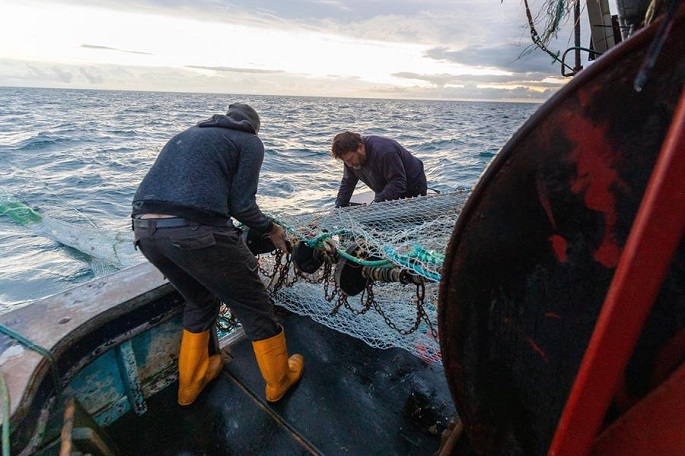Trawling the English Channel with Brexit on the horizon
Published : 12 Nov 2020, 21:40
Neil Witney has been fishing in the English Channel since the mid-1980s and has watched the local industry shrink over the decades, reported EFE-EPA.
Like many in the trade, he sees Brexit as an opportunity to revive the sector.
Witney skippers the wooden-hulled vessel, About Time, one of around 20 trawlers moored in the harbor in Newhaven, not far from Brighton, in East Sussex.
The local fleet was around 80 strong when he first started fishing, he says.
“Hopefully at the end of the year we can get some sort of deal, get our waters back, get control of our quota and then hopefully rebuild our industry and the rest of the maritime industry that goes with it,” he tells epa-efe.
“But hopefully we won’t get sold out like we have done in the past,” he adds. “DEFRA (the Department for Environment, Food and Rural Affairs) say they’re trying to correct things that have been going wrong over the years since we joined the common market back in the 1970s.”
Fishing has become a major sticking point in the Brexit negotiations.
An agreement on the issue is a prerequisite for a future trade deal between the UK and the European Union which, in theory, should be in place by end of the year.
Under the current common fisheries policy, EU vessels have access to fishing grounds in the Exclusive Economic Zones of other member states, although quotas on hauls are negotiated every year.
Once outside the EU, the UK will have full control over its EEZ, which stretches 200 nautical miles into the North Atlantic.
The UK government is using this as leverage in the discussions on how much access the bloc will have to British waters post-Brexit, and vice-versa, but the EU's negotiating team has previously argued in favor of preserving the current policy as much as possible.
It is a complex discussion on a sensitive issue and the exact implications of Brexit on the industry remain to be seen.
“What we’re after from Brexit is getting our waters back,” Witney says.
According to the UK Marine Management Organisation, between 2012-2016, EU vessels landed an annual average of 739,000 metric tonnes of fish, worth over 520 million pounds ($686 million), from the British EEZ, while UK vessels landed 546,000 tonnes of fish in British waters, worth around 633 million pounds.
UK vessels landed 94,000 tonnes of fish, valued at around 106 million pounds, from EU member states’ EEZs.
But while Brussels and London pore over the details of a future deal, Witney cracks on with his job.
Fishing from small trawlers is extremely weather dependent and he estimates that he can head out between 150 to 180 days per year. Each time, he aims to make two catches, which means his shift can last up to 14 hours.
On a typical day, he expects to catch around 30 different species of fish which, subject to quotas and marketability, will all be kept.
He leaves Newhaven at 5:30 am and navigates south to deeper water. After a couple of hours, Witney and his crew member Nathan Harman drop the nets and trawl for about three hours.
At around 11.30 am the nets are brought in and the first catch of the day is landed at the rear of the boat where it is sorted by species.
The fish are then gutted and washed before being placed into crates.
The nets are then lowered again and the second catch of the day is landed about three and a half hours later. The process is repeated until the trawler returns to harbor at around 6 pm to deposit the full catch on ice for storage.
“With the way climate change and seasons are changing we don't have the opportunity to fish for other species like we used to,” he says.
“We used to be able to fish for sprats, herrings, mackerel here but this year we’ve seen a lot of tuna, but we’ve got no quota for tuna or horse mackerel and we’ve lost all the market for things like sprats so at the moment it’s almost uneconomical to go fishing.
“Hopefully things will change for the better in the new year.”
The Brexit transition period will end on 31 December 2020, almost four years after the deeply divisive referendum that saw 52% of voters choose to leave the EU.


